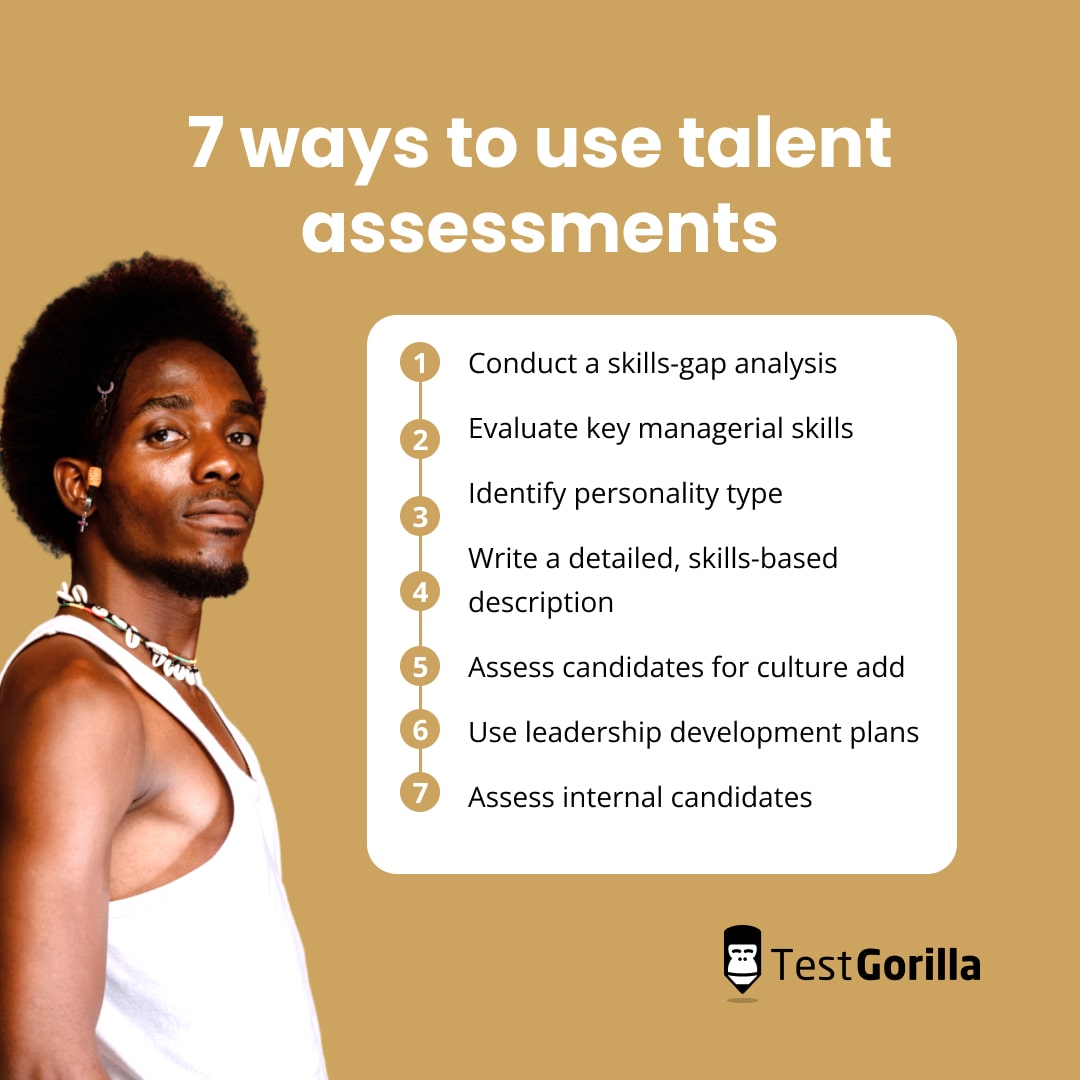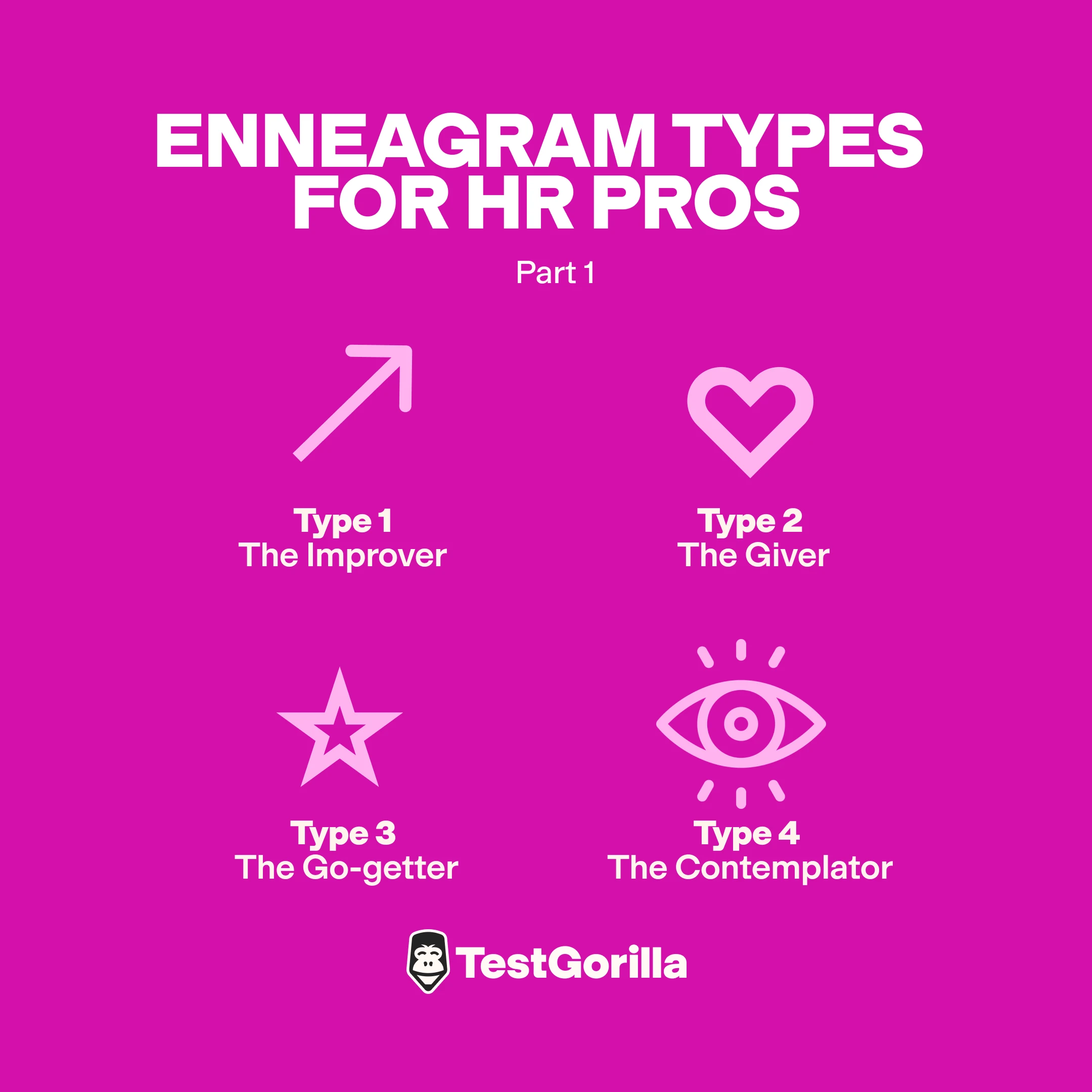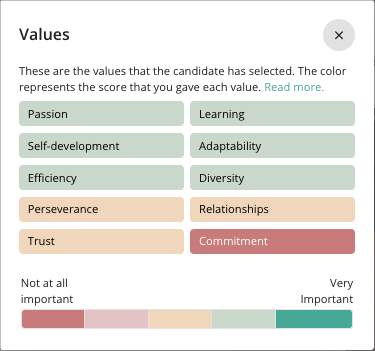Hiring a business manager: How talent assessments help you find the managerial skills you need
Hiring business managers can be difficult.
Job titles like “administrator,” “director,” and “coordinator” are broad terms that represent many different roles and responsibilities.
While you may think the responsibilities are similar enough that you can hire business manager candidates from any of them interchangeably, that’s far from the truth.
When hiring a business manager, you can’t hire a professional with years of experience in any management role. The ideal candidate is someone with specific skill sets that these roles don’t always bring.
Business managers aren’t unique to a single industry. An IT company may need a business manager, but so would a professional sports team, for example. That means you’re not even limited to your own industry.
But how do you find the candidate with the right skills from among those with wildly different career histories? That’s where talent assessments come in.
These multi-measure skills tests are powerful tools to identify and evaluate which skills your candidates actually have so you can hire the right business manager for your organization.
Our Business Operations Management test is an example of a role-specific skills test for hiring operations, production, and project managers.
Below, we explore what business managers are, the difficulties with hiring them, and the 7 ways to use talent assessments to overcome those challenges.
Table of contents
- What is a business manager?
- The difficulties with hiring a business manager
- How talent assessments help you hire a manager
- 7 ways to use talent assessments to optimize hiring a business manager
- How to hire a business manager
- Use talent assessments to get a 360-degree view of business manager candidates
What is a business manager?
A business manager is a professional who supervises the business affairs of an individual or organization. They occupy leadership positions and cater their strategies to the business needs of their employer.
Business managers can work in a variety of fields and take on industry-specific management positions, multitasking the management of things such as sales, marketing, operations, or the office itself.
Why are they important?
Business managers are important because they ensure the productivity, organization, and success of a business. They oversee departments and employees to pursue operational efficiency and increase profits.
A business manager provides leadership to a team by:
Setting business goals for employees to accomplish
Organizing teams to facilitate collaboration
Allocating resources to improve employee performance
Holding employees accountable
Assisting with human resources processes
Delegating tasks and responsibilities
Fostering communication skills
Motivating employees
Stabilizing workflows
The difficulties with hiring a business manager
Hiring a business manager is difficult because you need someone with the right blend of management skills like technical knowledge, bookkeeping, and interpersonal skills to lead your organization.
Some candidates may have heaps of technical know-how but struggle to motivate others. Some managers are great motivators but aren’t comfortable delegating tasks.
Many organizations struggle to hire a business manager because they simply don’t know what to look for.
Let’s take a closer look at the challenges of hiring a business manager.
Hiring the wrong type of manager
A major challenge that businesses face is choosing the right manager to lead their teams.
A business manager isn’t a one-size-fits-all role. Certain managers may benefit some organizations and ruin others. Hiring the wrong manager can damage communication, engagement, and job satisfaction.
In fact, research from Gallup shows that business owners fail to hire the right managers 82% of the time.[1]
Team leaders, for example, are specialized managers who concentrate on particular tasks and projects.
They’re focused on the ins and outs of their assignment, like meeting deadlines, new employee onboarding, and delegating tasks to other team members. They typically report to middle managers and department heads.
A middle manager, on the other hand, reports to the top-level manager, the highest management level. They facilitate communication between employees, lower tiers of management, and executive management.
If a small business hires a middle manager to lead specific teams, for example, they may struggle to complete tasks and delegate appropriately.
Shrinking your talent pool
Another difficulty with hiring a manager is knowing how to locate and attract skilled managers.
Businesses fail to achieve this with traditional hiring methods because their strict degree and resume requirements shrink the talent pool without adequately assessing candidates’ skills.
Degree inflation is a consequence of businesses focusing too much on whether managerial candidates are well-educated rather than if they have the skills for day-to-day operations.
There’s little evidence to suggest that an individual’s formal education background makes them a better manager.
Professor Lewis B. Ward of the Harvard Business School found that people who complete Harvard’s Advanced Management Program – a program focused on skills training rather than education – end up earning almost a third more than people with MBA degrees after 15 years of experience.[2]
Shrinking your talent pool excludes talented managers from diverse backgrounds and makes hiring the right candidate that much harder.
Hiring a manager that doesn’t suit your culture
Strong managers absorb and mitigate the typical business pressures most companies face.
Weak managers make those pressures worse because they don’t nurture or improve your positive workplace culture; they take away from it.
For example, if an organization has a traditionally hands-off culture that values independent thinking and dismantling workplace hierarchies, a poor manager may insert themselves too heavily into daily tasks or look for ways to show their authority.
Although this managerial style may fit other workplace cultures, like a law enforcement agency, it serves to disrupt and weaken the hands-off one.
Inadequately assessing soft skills
Traditional hiring methods also make it difficult or impossible to gauge soft skills, which are crucial for hiring business managers.
Sure, resumes, cover letters, and degrees don’t prove candidates’ soft skills. But isn’t that what interviews are for?
In fact, typical unstructured interviews are poor metrics for predicting soft skills and can actually introduce bias into your hiring process.
Most hiring managers consider an interview successful when a candidate shows charisma, charm, and confidence. Although these traits aren’t bad for a manager to have, only focusing on them inadequately assesses the other vital soft skills managers need, like:
Decision-making
Leadership and team management
Time management
Problem-solving
Focusing on charisma skews your results toward candidates who the interviewer is predisposed to unconsciously like, which often means candidates that share their social background, educational pedigree, gender, or ethnicity.
Increasing amounts of freelance managers
Freelancing and contracting are on the rise: 80% of employers say they are increasing the number of freelancers in their ranks.
The freelance project manager field, for example, is expected to grow 8% between 2018 and 2028, producing nearly 40,000 new job opportunities across the U.S.
Freelance, or contingent workers, can benefit organizations because they tend to be:
Self-motivated
Cheaper to hire
Self-trained
Flexible
But the quality of contingent workers can also be hard to identify in the absence of strong skills assessments.
They also tend to change workplace environments, juggle their responsibilities to other organizations, and aren’t fully incentivized in the absence of strong compensation and benefits packages that full-time managers receive.
The best insights on HR and recruitment, delivered to your inbox.
Biweekly updates. No spam. Unsubscribe any time.
How talent assessments help you hire a manager
Talent assessments are data-backed, multi-measure tests that evaluate job seekers’ skills, abilities, personalities, and behavioral attributes to hire quality candidates.
They are an integral part of skills-based hiring, which helped 92.7% of surveyed organizations reduce the number of mis-hires, according to the 2022 State of Skills-Based Hiring report.
Let’s explore the four main ways talent assessments help hire talented business managers.
1. Accurately assess managerial skills
As we saw earlier, “business manager” is a broad term that means different things to different people.
But there are certain skills that every manager needs, no matter where they work. Good managers with essential skills:
Avoid one-size-fits-all management styles
Clearly communicate goals and expectations
Delegate tasks effectively
Engage and motivate employees
Create a positive, fair, and inclusive work environment
Mentor employees effectively
Encourage feedback from employees and peers
Care about employees as people
TestGorilla’s Leadership and People Management test evaluates a candidate’s ability to:
Delegate authority and tasks
Offer timely guidance and feedback
Plan and support employee development
Be open-minded to ideas and plans
2. Evaluate industry-relevant skills
Business managers in different industries have different skills.
In addition to evaluating candidates’ more general managerial skills, multi-measure talent assessments also test managers’ role-specific skills.
Great restaurant managers’ skills include the skills listed in the previous section – like communication and task delegation. But, they also need to know how to perform in a fast-paced environment and monitor multiple active projects at once.
They bear the brunt of responsibility when processes break down and the dishes lack quality and consistency.
TestGorilla’s Restaurant Management test covers the following skills:
Managing staff culture
Food and safety standards
Maximizing diners’ experiences
Financial management
3. Reduce mis-hires
Talent assessments avoid the direct financial costs associated with mis-hires by gaining concrete data about whether a business manager can effectively lead an organization.
In other words, they weed out the candidates who don’t have the skills they say they do.
They also reduce the unseen, personal costs of mis-hires like:
Low team morale
Poor client relationships due to team turnover
Negative company culture
Employee burnout
TruTrip, for example, is a travel management company that made mis-hires in the past, costing the organization time and money. So, TruTrip founder Hugh Batley decided to use TestGorilla’s talent assessments to find candidates who actually had the skills to succeed.
The hiring team let through more candidates they would have overlooked previously based on outdated resume and experience requirements.
Now, TruTrip can:
Objectively assess applicants’ skills and knowledge
Eliminate bias from its hiring practices
Consistently make better hiring decisions
Reduce its dependence on resume screening
Improve new employee experiences
They took advantage of multi-measure skills and personality tests to reduce the cost to hire a business manager – or any other employee – within their organization.
4. Expand your hiring pool
Multi-measure talent assessments play a pivotal role in helping you manage and expand your talent pool to include more diverse candidates.
But managerial diversity isn’t just an ethical priority.
Research shows that increasing racial diversity in executive hiring actually boosts productivity.[3]
As it turns out, diversity hiring leads people to consider multiple perspectives and develop more effective approaches to complex problems. For senior management, this equates to more creativity, innovation, and flexibility in the workplace.
Talent assessments expand your talent pool by eliminating bias-prone resume and degree requirements, but they also move away from the problematic culture-fit approach in favor of “culture add.”
Culture-fit approaches are great for finding a manager who happens to share the same interests, opinions, and perspectives as your hiring team. But they also limit your talent pools to only those types of candidates.
Even worse, their superficial cultural alignment only increases groupthink, homogeneity, and unimaginative leadership.
Talent assessments evaluate managers’ abilities to challenge the status quo of your organization to find stronger, more effective solutions to improving their team’s performance.
Now, let’s explore some practical ways you can use talent assessments when hiring a manager for your business.
7 ways to use talent assessments to optimize hiring a business manager
As we’ve seen, talent assessments provide many benefits to your hiring process when it comes to business manager jobs.
But how do you get started and take advantage of these benefits and improve your hiring efficiency?
Let’s explore seven ways to use talent assessments to evaluate and hire great business managers.
Using talent assessments at a glance
7 ways to use talent assessments | How it works |
1. Conduct a skills-gap analysis | Discover what skills employees need to achieve organizational goals by studying the existing skills of your workforce |
2. Evaluate key managerial skills | Turn to talent assessments to evaluate managers’ situational judgment, role-specific skills, and cognitive ability |
3. Identify personality type | Understand candidate personality types and use them to judge their strengths and weaknesses |
4. Write a detailed, skills-based description | Craft job descriptions that describe the skills and responsibilities of the role attract higher-quality candidates |
5. Assess candidates for culture add | Use culture-add tests to evaluate a candidate’s potential to expand your existing culture |
6. Use leadership development plans | Rely on leadership development plans to upskill workers and transform them into future leaders |
7. Assess internal candidates | Identify existing talent that has the potential to lead your organization in the future |
1. Conduct a skills-gap analysis
The first step in finding the right manager is deciding the type of business manager you need.
To do that, you need to identify and understand the skills gaps present within your organization. Skills gaps are the difference between the existing skills of your workforce and the skills your employees need to achieve organizational goals.
A skills gap analysis studies this difference and provides tangible strategies to:
Adapt training efforts to employees’ individual needs
Allocate learning and development resources more efficiently
Improve competitiveness
Build a comprehensive talent strategy
Design a hiring strategy tailored to your needs
Talent assessments are an integral part of a skills-gap analysis because they measure your current managers’ skills and strengthen your existing workforce.
Managers can see where their skills fall short, and employers can determine whether gaps can be bridged internally or if a new hire is required.
2. Evaluate key managerial skills
Talent assessments evaluate managers’ skills in areas like situational judgment, role-specific tasks, and cognitive ability.
For example, you can give your business manager candidates our role-specific Project Management test to evaluate their ability to manage projects and achieve key business goals.
You can also assess their strategy, innovation, performance improvement, or sales and marketing skills with our Business Judgment test.
An experienced business manager candidate may have a lot of role-specific knowledge and compelling views on performance management. But what is their thought process like?
Cognitive ability tests are a great tool to measure a candidate’s mental abilities across a number of categories, like:
Attention to detail
Problem-solving
Critical thinking
Numerical reasoning
Reading comprehension
Spatial reasoning
3. Identify personality type
Not every business manager has the same personality type – and not every business manager should.
Different personality types offer different benefits and tools to improve your organizational and individual employees’ successes.
TestGorilla’s Enneagram Personality test, for example, maps out nine different personalities on a nine-pointed diagram to describe the core beliefs and worldviews from which each person operates.
Although each Enneagram type can make an excellent leader, Type Eights, called the Master type, usually occupy leadership positions due to their boldness, fearless attitude, and ability to delegate tasks efficiently.
Each personality type has its own strengths and weaknesses. It’s important to determine which personality your organization needs from its business managers.
Does your organization have low morale? Are there frequent disagreements and office confrontations?
An Enneagram Type Nine, the Agreeable type, would be a great candidate for this situation. They have industry-relevant skills and can also see multiple points of view to establish group consensus.
Type Nines value harmony and know how to establish it in the workplace. They are great listeners and know how to support others effectively.
Are your projects hitting frequent roadblocks? Are your teams struggling to solve work-related problems?
Type Five, the Pioneer type, are skilled problem-solvers who can make connections that others might miss. They’re also able to distance themselves emotionally from a project or situation to find the best possible workaround.
Explore our other personality assessments, like the DISC Personality test, in our extensive test library to find the best personality fit for your business manager role.
4. Write a detailed, skills-based job description
To truly unlock the benefits of talent assessments discussed earlier, you need to write clear job descriptions that describe the skills your managers need to succeed in your organization.
Stop listing unnecessary requirements and pie-in-the-sky preferences. Focus on skills, competencies, and knowledge.
STARs, or workers Skilled Through Alternative Routes, can make great business manager candidates because they:
Expand your talent pool
Improve problem-solving
Enhance work quality and customer satisfaction
Increase productivity
These non-traditional workers don’t need to have their hands held to tackle complex problems and manage others’ developments. They are self-motivated and better equipped to communicate with different audiences than candidates who all have the same educational and experience backgrounds.
STARs can also bring niche skills to the table to go above and beyond the traditional requirements for a business manager to grow your business.
Detailed job descriptions also let your managers know what to expect from the role and the specific talent assessments they’ll be required to take.
Out of the 2,666 employees surveyed in the State of Skills-Based Hiring 2022, more than 54% said they prefer skills-based talent assessments in the hiring process.
So, don’t hesitate to advertise your talent assessments – skilled business manager candidates may actually be more inclined to apply if they see talent assessments on your job descriptions.
5. Assess candidates with a culture-add test
“Culture,” like “business manager,” can be a bulky term that gets tossed around a lot.
But how can you actually define a candidate’s ability to support, expand, and nurture your organizational culture?
Our Culture Add test assesses whether your business manager candidate’s values and behaviors align with your organization.
It also identifies high-potential candidates who have the motivation to climb the managerial ranks of your organization instead of settling for upholding the status quo.
TestGorilla’s culture add tests are customizable and begin by first setting the standard for your culture through a questionnaire and then evaluating how well your candidate aligns with that survey.
You can set the answers yourself, invite someone else to set the answers, or reuse answers from a previous survey. A candidate’s overall score is presented as a percentage, with each section worth 50% of the total score.
To get a more detailed breakdown of how your candidate answered, click on the percentage in the expanded view.
6. Attract and develop future leaders with leadership development plans
Leadership development planning isn’t just a great development strategy for existing employees.
It’s a crucial tool to attract and retain skilled future leaders, business managers included.
Adobe, for example, starts its leadership training before employees even properly enter the workforce.
The company hires interns directly from schools and organizations, like Girls Who Code. It then assesses and develops their technical and leadership skills with regular check-ins and performance reviews, all while encouraging feedback and developing a strong relationship with future leaders.[4]
Recruiting talent from nontraditional education programs, like Adobe, offers several significant benefits because diversity in the workplace makes businesses more:
Innovative and creative: Having a diverse workforce means that individual employees are more likely to have varied approaches to the same problems.
Efficient at problem-solving: Encouraging outside-the-box thinking also helps employees solve problems faster because they are free to explore innovative, more effective solutions.
Adaptable: When employees are allowed to experiment and challenge the status quo within an organization, they make better decisions and are more amenable to change.
Productive: Like-minded people tend to settle for what they feel comfortable with. Diversity stretches people beyond their limits to be the best versions of their authentic and productive selves.
Implementing talent assessments, like our Adobe Photoshop Skills test, into your leadership development plans is another great way to monitor the role-specific skills present in your talent pipeline and pinpoint high-potential candidates.
7. Assess internal candidates
In addition to building a promising talent pipeline with leadership development plans, talent assessments are a valuable tool for assessing internal business manager candidates.
Internal recruitment is a great way to find existing employees who are ready to take on a business manager role.
Self-assessments, technical skills tests, and behavioral assessments are professional development strategies that remove the added step of having to make an outside hire, saving you both time and money.
Talent assessment data isn’t just valuable to an employer or evaluator – sharing the results of skills assessments with employees:
Gives them more control of their developmental journey
Attracts boomerang employees
Widens the talent pool
Proves you’re an inclusive organization
How to hire a business manager
When hiring a business manager, it’s important to use all of the tools you have at your disposal in addition to talent assessments.
Structured interviews, for example, are an objective way to assess a business manager’s behavior and situational judgment. It’s important to select objective, skills-centric interview questions to ask when hiring a manager.
Then, ask each candidate the same questions in the same order before grading them to identify top performers.
In addition, reverse mentoring is a developmental strategy that puts high-potential junior employees in leadership positions over senior leaders to give them hands-on managerial experience while learning from a seasoned veteran.
For all the details on how to hire a business manager, explore our deep-dive guide here.
Use talent assessments to get a 360-degree view of business manager candidates
Hiring a manager with the right technical skills, personality, and leadership style catered to your organization can feel like an Everest-sized challenge.
The mis-hiring possibilities are everywhere: One candidate may look like a good business manager on paper but doesn’t have strong financial skills. Another candidate may have excellent communication and organization skills but can’t navigate workplace conflicts.
Multi-measure talent assessments are part of a holistic hiring process that gives you a 360-degree view of every business manager candidate in your talent pool.
They enable you to evaluate candidates’ key managerial skills, personality types, and culture add values, all while addressing internal skills gaps and finding the best candidate – whether they’re new to your organization, have been with you for years, or are a former employee rejoining your ranks.
Take an in-depth tour of our test library to find and customize the right talent assessment for your next business manager.
Sources
Beck, Randall J.; Harter, Jim. "Why Great Managers Are So Rare". Gallup. Retrieved August 12, 2023. https://www.gallup.com/workplace/231593/why-great-managers-rare.aspx
Livingston, Sterling J. (January 1971). “Myth of the Well-Educated Manager”. Harvard Business Review. Retrieved August 12, 2023. https://hbr.org/1971/01/myth-of-the-well-educated-manager
Orlando C. Richard. et al. (October 27, 2021). “The Effects of Racial Diversity Congruence between Upper Management and Lower Management on Firm Productivity”. Academy of Management. Retrieved August 12, 2023. https://journals.aom.org/doi/10.5465/amj.2019.0468
D'Sa-Wilson, Meryl. (February 23, 2023). “6 Examples of companies with incredible leadership development programs”. Together. Retrieved August 12, 2023. https://www.togetherplatform.com/blog/examples-of-leadership-development-programs
You've scrolled this far
Why not try TestGorilla for free, and see what happens when you put skills first.






















